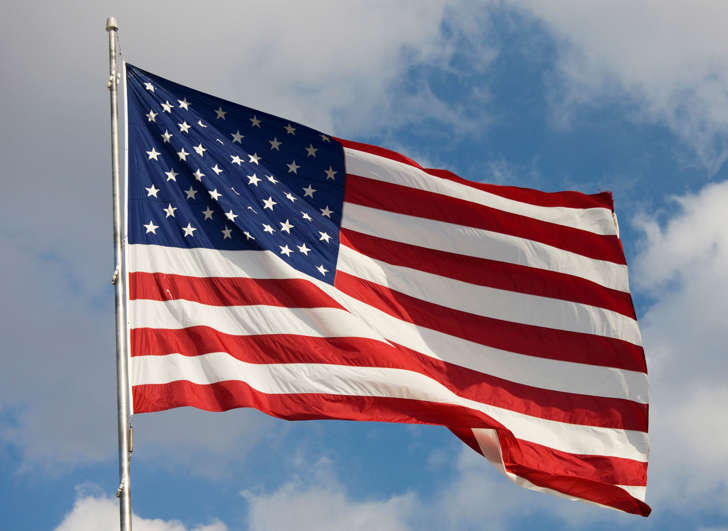
Trump tweets on 'consequences' for flag burning
President-elect Donald Trump on Tuesday threatened loss of citizenship or jail for those who burn the American flag, saying such protests — which the Supreme Court has declared to be free speech — should carry “consequences.”
Trump offered his thoughts in an early-morning post on Twitter, saying, “Nobody should be allowed to burn the American flag.”Flag burning was ruled to be constitutionally protected speech under the First Amendment in a 1990 Supreme Court case, United States v. Eichman, that struck down a law seeking to prevent its desecration. Moreover, a 1958 Supreme Court decision rejected the practice of stripping U.S. citizenship as a form of criminal punishment.
Trump did not say what inspired his proposal, but it comes just days after a college in western Massachusetts decided to stop flying all flags, including U.S. flags, after someone there burned one in protest of Trump’s election victory over Democratic presidential nominee Hillary Clinton.
Hundreds of veterans and others gathered Sunday to protest the decision by Hampshire College in Amherst, Mass., to remove the flag.
Trump’s latest interest in curbing First Amendment protections follows several other actions related to free speech, including his blacklisting of reporters who fell out of favor with his campaign and a suggestion that he would “open up” libel laws to make it easier to sue the news media.
Trump's tweet also demonstrated an ability that has continued beyond his campaign to divert public attention from other issues of the day. Earlier this week, he caused an uproar by asserting on Twitter, without evidence, that millions of people voted illegally for Clinton.
During a television appearance Tuesday shortly after Trump’s tweet, House Majority Leader Kevin McCarthy (R-Calif.) suggested that Congress is unlikely to move on the issue of flag burning.
“We have a First Amendment right, but where I come from, you honor the flag,” McCarthy said on MSNBC’s “Morning Joe.” “If someone wanted to show their First Amendment right, I’d be afraid for their safety, but we’ll protect our First Amendment.”  © Tim Graham/Getty Images An American flag flies on flagpole in Florida. Trump transition spokesman Jason Miller defended his boss’s position during an appearance on CNN.
© Tim Graham/Getty Images An American flag flies on flagpole in Florida. Trump transition spokesman Jason Miller defended his boss’s position during an appearance on CNN.
 © Tim Graham/Getty Images An American flag flies on flagpole in Florida. Trump transition spokesman Jason Miller defended his boss’s position during an appearance on CNN.
© Tim Graham/Getty Images An American flag flies on flagpole in Florida. Trump transition spokesman Jason Miller defended his boss’s position during an appearance on CNN.
“Flag burning should be illegal,” he said repeatedly on the CNN’s “New Day.”
Trump’s tweet revives a debate that was settled in the courts more than 25 years ago.
In 1989, a closely divided Supreme Court struck down on First Amendment grounds a Texas statute banning flag burning. Congress responded swiftly by passing the Flag Protection Act of 1989 — a law that was invalidated by the court’s 1990 ruling.
There have been multiple attempts in Congress — none of them successful — to get around the court ruling since then.
That included a 2005 bill sponsored by Clinton, then a senator from New York, that would have outlawed flag desecration when the intent was found to be a threat to public safety. Violations would have been punishable by up to a year in jail and a $100,000 fine.
In 2011, a State of the First Amendment survey found that 39 percent supported a constitutional amendment to make flag burning illegal while 58 percent opposed it. The survey presented brief arguments for both positions before posing the question.
A year later, the Senate narrowly failed to approve a constitutional amendment banning flag-burning, with now-Senate majority leader Mitch McConnell (R-Ky.) voting in opposition.
There is little recent polling related to flag burning, but past surveys have shown the issue divides Americans.
Earlier polls that did not explicitly mention First Amendment issues found more support for making flag burning illegal.
In a 2006 Gallup/USA Today poll, for instance, 56 percent said that they would favor a constitutional amendment that would allow Congress and state governments to make it illegal to burn the American flag. Forty-one percent said they were opposed.WP

No comments:
Post a Comment